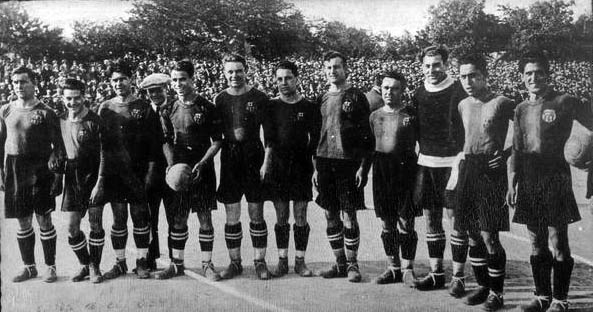These were difficult times. The dictatorship of Primo de Rivera was very hard for the aspirations of Catalonia, where catalanism had already gone beyond the linguistic and cultural borders to enter into more political and self-government fields. All this progress would be cut short with the coup d’etat and new policies that prohibited the Catalan language, the “Senyera” and any type of demonstration.
On May 10 1925, Barça was proclaimed champion of the Spanish Championship in Seville against Arenas de Getxo by 2-0. The welcome to the champions unleashed the popular madness. It was a celebration that, in times of dictatorship and manifest restriction of freedoms against Catalonia, everyone took as an excuse to make demonstrations in the street that otherwise would have been banned. Barça took the baton of vindictive Catalanism and the blaugrana flag replaced the “Senyera”, but the feeling was the same and the authorities looked expectantly in search of a reason to argue a firm action on the Club.
The Rambles, a meeting point
The anecdote of that day of the final was lived on the Rambles, specifically in front of the office of the newspaper El Sol, where the results of the matches were being published. At that time there was no TV and the very incipient radio did not yet report on football and, consequently, the only way to find out the news was to wait in the street for the newspapers’ editorial offices to be informed and share the news. This was done in Canaletes, next to the meeting point that meant the kiosk, as the new tradition demanded, and the existing FC Barcelona supporters’ clubs in the Catalan capital went there.
Rivalry with Espanyol taken to the political level
While a generation of members, supporters’ clubs and curious fans were waiting for news of the final, the newspaper had the idea of first reporting the score of a friendly match played by Espanyol. The reaction in the form of a whistle was anthological. Then, people from El Sol reacted by announcing the victory of Barça among great celebrations. Some of those present, of unmistakable right-wing ideology, took it to heart and chose to denounce it to the authorities, purposely confusing the booing of Espanyol with an alleged offense to Spain. To round it off, in fair correspondence, the complainants claimed that the shouts of joy at the result of Barça were simply unequivocal chants of support for separatism.
These situations were creating an atmosphere of permanent potential conflicts that put the spotlight of the authorities in every situation, demonstration or activity developed by FC Barcelona. In addition to these tensions, to mention just another significant example, there was the famous “small change derby” of Les Corts, on November 23 1924, where members of the Penya Ardèvol of FC Barcelona had altercations with members of the Peña Ibèrica of RCD Espanyol, throwing on the field a pile of coins that made the match to be suspended after 23 minutes of play. On January 15 1925, the match was replayed from the start. This was the preamble to the most notorious case, the one that has gone down in the black history of the club: the suspension of all activity of Futbol Club Barcelona for 6 months.






